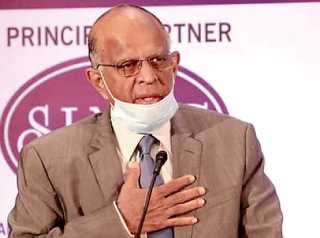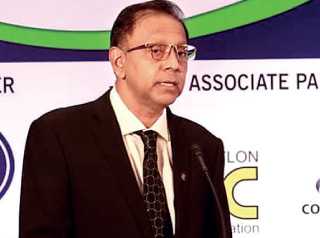Sunday Feb 22, 2026
Sunday Feb 22, 2026
Monday, 15 February 2021 02:09 - - {{hitsCtrl.values.hits}}

Law Commission of Sri Lanka President Romesh De Silva PC

Chief Guest Justice Minister Ali Sabry

NLC 2021 Chairman Hiran M.C. de Alwis
By Hiruni Dabarera
A top legal professional mooted 15 cases, five per bench, to be concluded by the Supreme Court within a day to reduce the pending cases in the Supreme Court by 1,000, which were recorded as 4,767 cases at the end of 2019.
“One of the pertinent issues that the legal profession is facing at present is the backlog of cases. With new cases being filed every year, the total number of cases that are pending will keep increasing if it continues at the present rate. Hence, lawyers must work cooperatively with the Bench in order to provide a practical solution to this issue,” stated Law Commission of Sri Lanka President Romesh De Silva PC, during his keynote address at the Inauguration Ceremony of the National Law Conference 2021 organised by the BASL on 12 February at Galadari, Colombo in hybrid format. Chief Guest was Justice Minister Ali Sabry.
Lauding the BASL’s selection of the timely theme of ‘Futurism’ for the Conference, the PC defined the theme’s relevance as the understanding of what the society will require in future and being proactive in changing the present laws and mechanisms to meet such aspirations. Noting some of the new challenges of the legal profession, he brought light to the substitution of Artificial Intelligence (AI) for research and writing expertise of lawyers and junior lawyers.
Currently AI has been designed to write political speeches in the US and in future it will be utilised to conduct written submissions, create pleadings, etc. rendering certain services of lawyers as defunct. Further, De Silva went on to reflect on the crucial role of the profession in not being deluded on what the future holds and identify challenges as above which are eminent and facilitate a paradigm shift to meet them. Courage is necessary to cruise through unchartered waters, he stressed.
Speaking on the challenges the legal profession is facing at present, NLC 2021 Chairman Hiran M.C. de Alwis said: “There is no laws delays, the term has no meaning. Based on our experience what is primarily needed is the effective enforcement of existing laws, and the existing infrastructure must be modernised like digitalisation of the ongoing processes for this.” He added how he does not subscribe to the notion of ‘new normal’, which is the continuation of chaos but how the legal profession must instead look at fashioning a ‘new dynamic’ to meet the challenges of the time.
BASL President PC Kalinga Indatissa commended the Minister of Justice for being proactive in identifying areas that need immediate reforms within the present laws of Sri Lanka and working together with the BASL in addressing them in his speech. He also stated how they hope to condense and summarise the areas that require law reforms identified during the Conference and submit them to the relevant authorities for their consideration at its completion.
The Conference which was conducted in both virtual and physical format for the first time ever focused on a series of timely topics in the legal profession over a period of two days (12 and 13 February) with the participation of many distinguished legal and non-legal, foreign and local professionals. Due to present concerns on ease of business ranking, the conference constituted of a session on effective enforcement of business transactions.
Also, aspects like new shareholder possibilities like real estate investment trust, the new Securities and Exchange Commission Act, issues due to increase in digital banking, issues caused to non-banking financial institutions, electronic transmission of records and international cross border data flows were discussed. Challenges in new fields of criminal law like cybercrimes, money laundering and challenges with increased usage of Internet by children like child abuse and mental abuse and harassment were also addressed.
The Conference also focused on quarantine laws, workplace practices and pertinent issues in labour laws and ethics and professional conduct in the legal profession.
Other areas like fundamental freedoms, religious and language rights, defamation in digital space and how the existing law can be utilised to meet this, importance of television rights, broadcasting rights and sponsorship contracts with sports gaining popularity as a medium of entertainment were also debated on during the course of the two days.